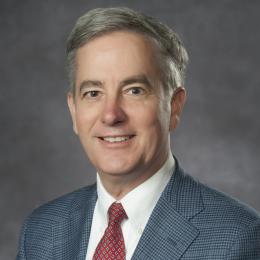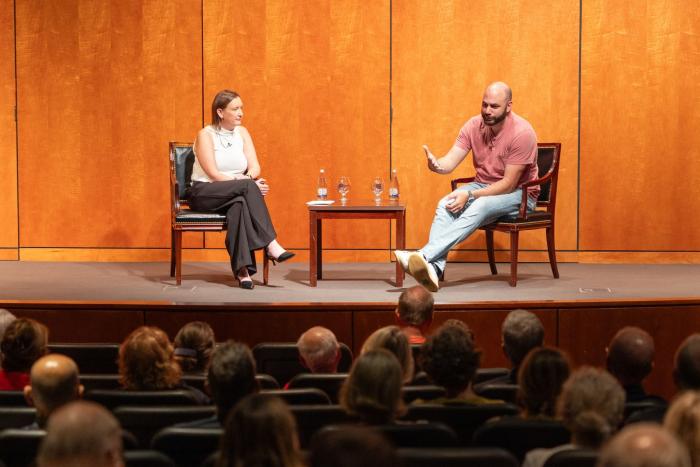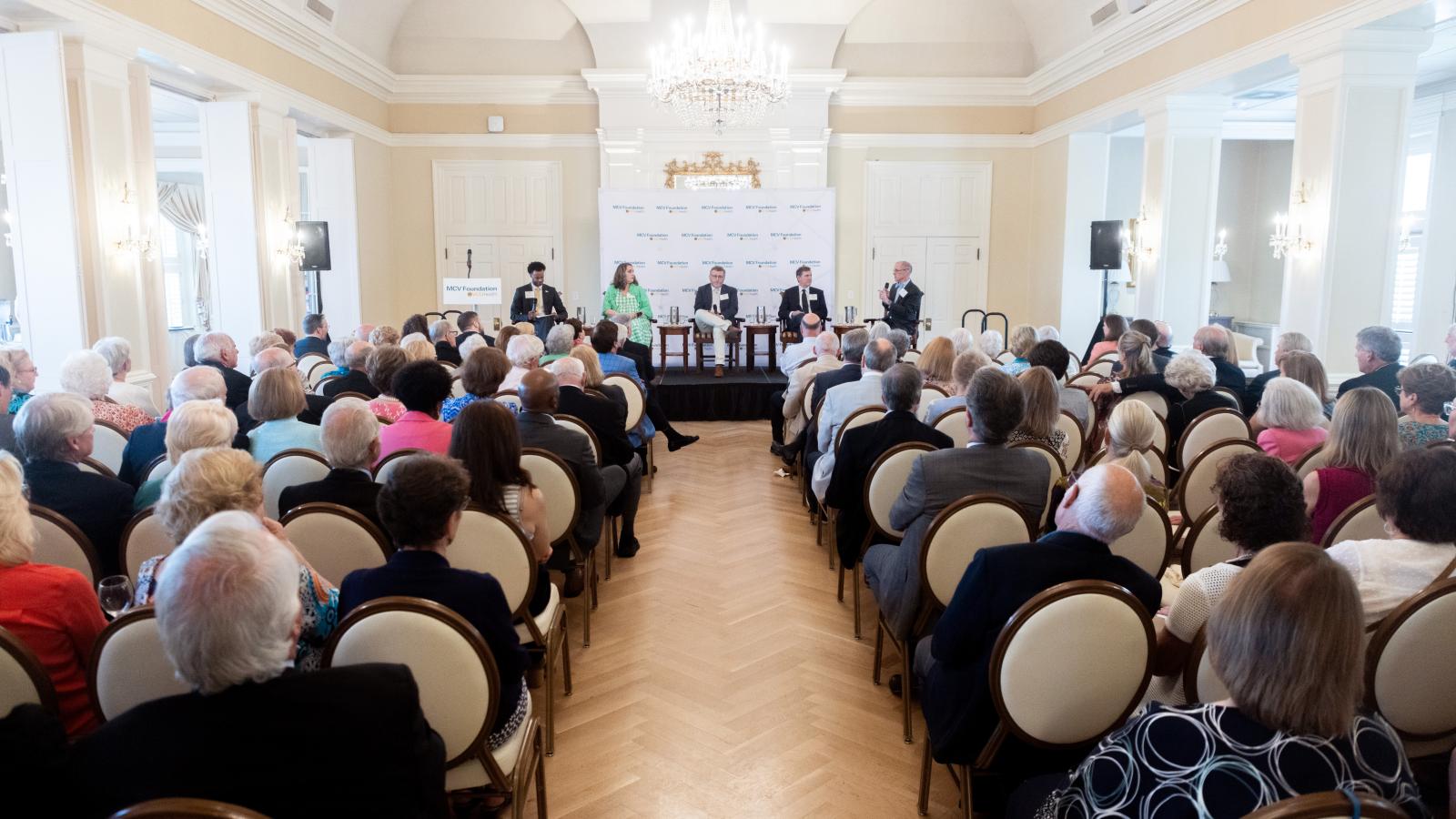
Guests at the MCV Foundation’s Discovery Series RVA event on May 22 at The Country Club of Virginia heard about exciting advancements in neuroscience research and care. Photos: Daniel Sangjib Min, MCV Foundation
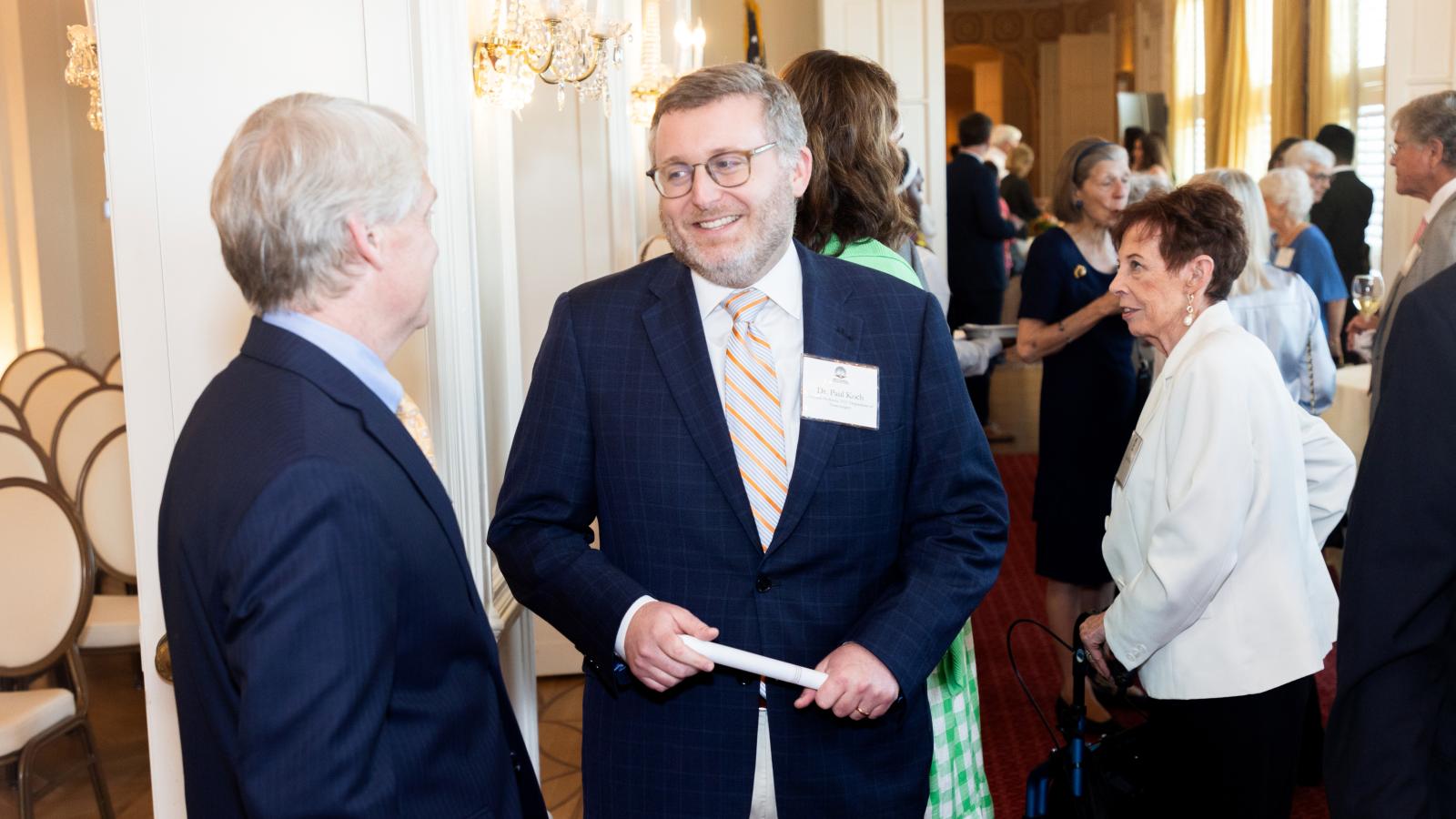
Paul F. Koch, M.D., assistant professor, VCU Department of Neurosurgery, speaks to guests at the MCV Foundation’s Discovery Series RVA event on May 22.
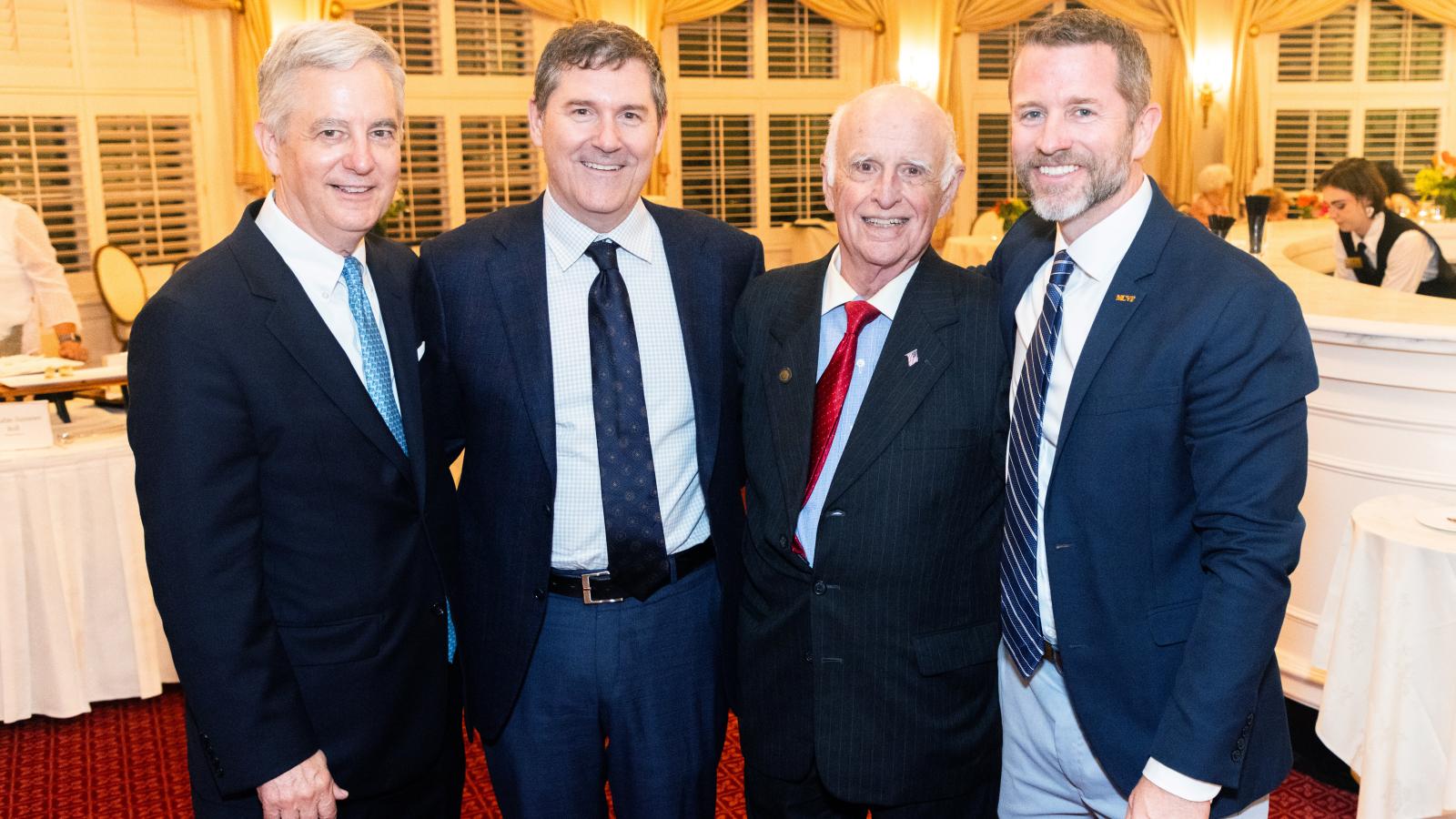
David D. Limbrick Jr., M.D., Ph.D., professor and chair, VCU Department of Neurosurgery and the department’s James W. and Frances G. McGlothlin Chair, second from left, with Brian Thomas, MCV Foundation executive vice president and chief development officer, Harry F. Young, M.D., former chair of VCU School of Medicine’s Department of Neurosurgery, and Niles Eggleston, senior associate vice president for medical philanthropy and alumni relations for VCU Health.
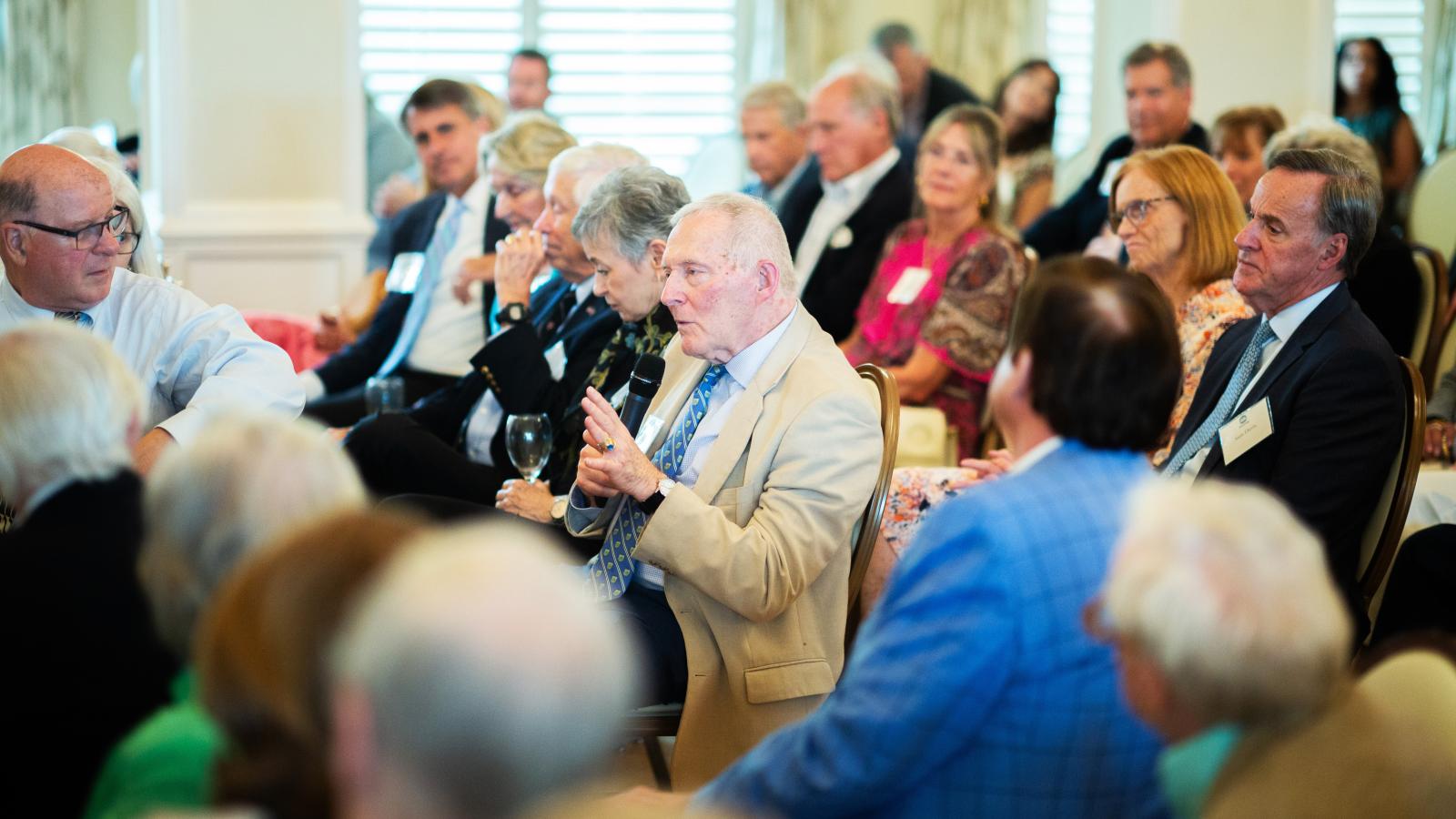
Charles F. Bryan, Jr., Ph.D., MCV Foundation Leadership Council member, asks a question during the May 22 Discovery Series RVA event.
Foundation’s Discovery Series RVA Expands Understanding of Neuroscience
Brain diseases have increasingly become one of the leading causes of disability in the world. They are more common than cancer, heart disease and diabetes. A staggering one in three people will develop a brain disease in their lifetime.
Thankfully, from right here in Richmond, VCU Health is a national driver of advancements in research and care for brain diseases. A record-setting crowd of more than 150 guests heard from some of VCU Health’s leading neuroscience experts on May 22 during the MCV Foundation’s signature Discovery Series RVA event at The Country Club of Virginia.
Brain diseases tend to be very severe, and that severity pushes us to advance very quickly.
David D. Limbrick Jr., M.D., Ph.D., professor and chair, VCU Department of Neurosurgery and James W. and Frances G. McGlothlin Chair
In 2013, the foundation established the Discovery Series in Williamsburg as an outreach program aimed at raising awareness of the outstanding medical research, care and education happening every day on the MCV Campus. In 2019, the series expanded to Richmond. Each event features leading VCU Health researchers, clinicians and scholars who offer their knowledge and expertise during panel discussions, followed by opportunities to engage with attendees in informal conversations.
The topic for the Richmond Discover Series RVA event was “Neuroscience Frontiers: Redefining Our Understanding of the Human Brain.” Michael Elliott, Pharm.D., senior vice president and COO of VCU Health, moderated the expert panel, which featured: A. Gordon Smith, M.D., professor and chair, VCU Department of Neurology and the Kenneth and Dianne Wright Distinguished Chair in Clinical and Translational Research; David D. Limbrick Jr., M.D., Ph.D., professor and chair, VCU Department of Neurosurgery and the department’s James W. and Frances G. McGlothlin Chair; Leslie Cloud, M.D., associate professor and Rogliano Family Endowed Chair in the VCU Department of Neurology and director of the VCU School of Medicine’s Parkinson’s Disease Program at the VCU Parkinson’s and Movement Disorders Center; and Paul F. Koch, M.D., assistant professor, VCU Department of Neurosurgery.
The night’s discussion focused on exciting neuroscience advancements and research in the fields of focused ultrasound, gene therapies, neuromodulation and more.
**
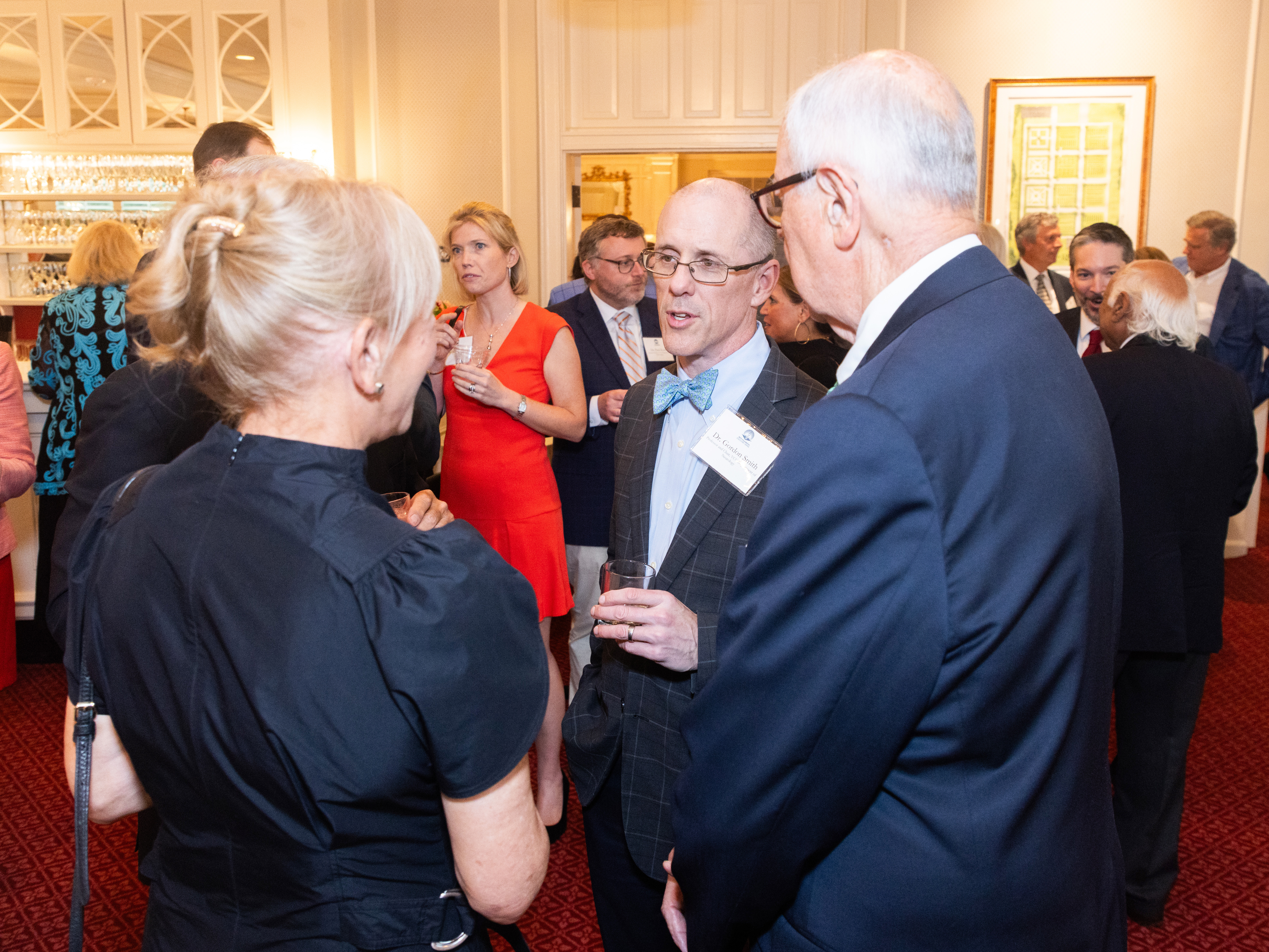
Dr. Smith kicked off the evening by explaining that the top four brain diseases, by order of disability frequency in the U.S., include stroke, migraine, dementia and diabetic neuropathy, a nerve disease that affects individuals who have diabetes.
With an extensive background working with neuropathy, Dr. Smith said many commonly used chemotherapy drugs for cancer cause neuropathy, which causes pain, gait and balance issues and while most people recover, some do not. VCU Health, however, is currently studying different care delivery models that “flip our care model on its head.” One of them, for example, looks at a home health monitoring that uses an app or a website. Rather than having patients schedule appointments and come to the MCV Campus when they are in pain, a nurse practitioner will contact them at home and work through an evidence-based algorithm for care.
“Cancer studies show that if you monitor symptoms, people survive longer,” Dr. Smith said, “so we’re doing this to not only manage pain and neuropathy, but as a model for how we manage chronic diseases.”
**
Having access to the “crown jewel of existence”— the brain and the central nervous system — is an honor but also a tremendous responsibility, said Dr. Limbrick.
“Brain diseases tend to be very severe, and that severity pushes us to advance very quickly,” he said. One research area that continues to emerge is neuro imaging and optogenetics, which allows physicians and researchers to understand brain circuitry better than ever before. He said VCU Health is moving toward molecular and cellular therapies that incorporate stereotactic surgeries where delicate robot-guided movements will allow for treatments in new ways.
To that point, Dr. Koch emphasized that laser technology is indeed changing the landscape for research and care for those with tumors, epilepsy, cancer and more. Focused ultrasound, for example, is a treatment that uses sound waves to burn holes with exact precision in areas of the brain that disrupt the circuits causing essential tremor and other Parkinson’s-related problems.
Such treatments are also changing the nature of care, he said, in that it is moving out of traditional operating rooms and into areas like MRI suites. There is also a push for multidisciplinary teams taking care of patients thanks to technology that’s less invasive and safer and allows translational research to be front and center.
“We’re in an area of truly personalized medicine,” he said, “where we really learn something about the particular genetic makeup of an individual and then choose a therapy.”
**
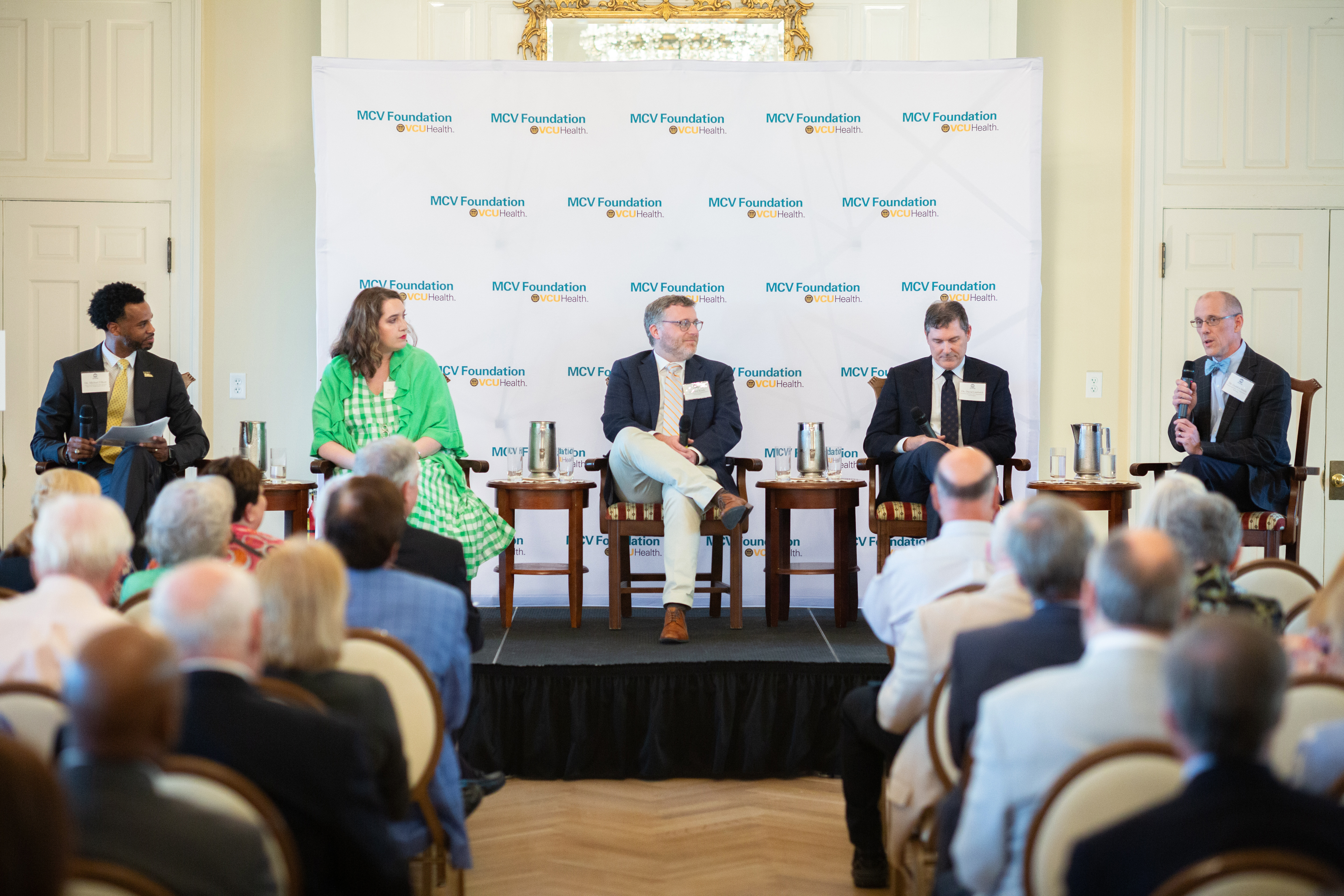
The VCU Parkinson’s and Movement Disorders Center is one of only 33 nationwide recognized by the Parkinson’s Foundation as a Center of Excellence and the only center with such status in Virginia. When asked about the most unique service offered there, Dr. Cloud gave a preview of a multidisciplinary gait clinic currently in development at VCU Health. for patients with refractory gait disorders who have failed to find relief within traditional clinics. She described the clinic as having an obstacle course that triggers walking problems. Patients will be studied through different conditions, such as on or off their medications, on or off deep brain stimulation, an existing treatment for essential tremor and other movement-related disorders.
The clinic, in development thanks to generous donors, will be one-of-a-kind, Dr. Cloud said.
“I have no doubt that this will become a natural destination for patients with refractory gait disorders,” she said. “There really is an unmet clinical need and there’s really nothing like it anywhere else.”
Another futuristic advancement just around the corner is a wearable device that incorporates LiDAR technology to help patients navigate their surroundings and ultimately, prevent falls.
LiDAR technology uses lasers to measure distances, thus creating a 3D map of the surroundings. It is the same technology found in self-driving cars, Dr. Cloud said, but it has the potential to help patients who experience symptoms such as freezing gait. The device scans 360 degrees around the patient and could pick up on changes in the environment, such going from a carpeted area to a hardwood floor, which is a known trigger for gait issues. The device would provide vibrating stimulation to alert the body of environmental changes and prevent a fall.
“The system would anticipate that change in the floor pattern well before the individual gets there,” she said, “recognize that as a high-risk scenario and then deliver that sensory cue at the moment it’s needed before the freeze actually happens.”
**
Discovery Series events are made possible, in large part, by volunteer host committees who offer insight into the programming and connect events to their communities. In Richmond, the committee includes Tenley and Wyatt Beazley, Maura and Mike Bisceglia, Anne and Roger Boevé, Susan and Steve Gaidos, Gail and Earl Johnson, Patricia and David Lyons, Becky Purdue and Judi and Jim Starkey.
If you would like to learn more about the Discovery Series RVA, please contact Brian Thomas, executive vice president and chief development officer at the MCV Foundation.
